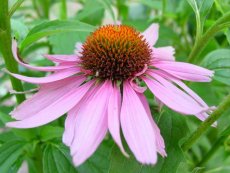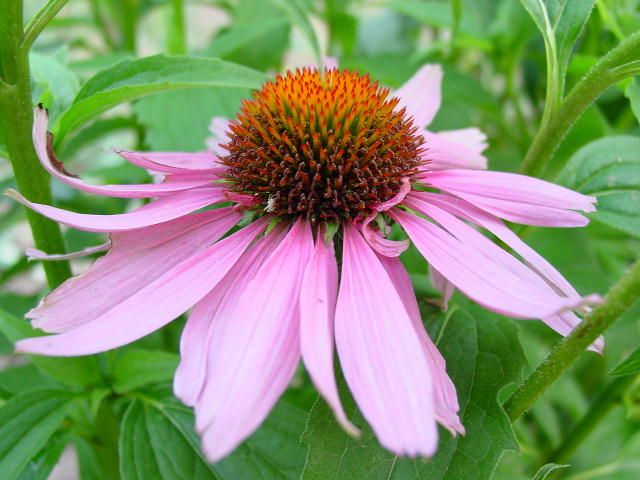Medical expert of the article
New publications
Preparations
Echinacea for colds
Last reviewed: 07.07.2025

All iLive content is medically reviewed or fact checked to ensure as much factual accuracy as possible.
We have strict sourcing guidelines and only link to reputable media sites, academic research institutions and, whenever possible, medically peer reviewed studies. Note that the numbers in parentheses ([1], [2], etc.) are clickable links to these studies.
If you feel that any of our content is inaccurate, out-of-date, or otherwise questionable, please select it and press Ctrl + Enter.

What is Echinacea?
Echinacea is a plant or supplement that people often use to treat colds. Many people believe that echinacea can boost the immune system and reduce the severity and duration of colds. Echinacea is one of the best-selling cold products in the United States. People have used echinacea as a medicine for centuries. The leaves, stems, flowers, and roots are used to make supplements, liquid extracts, and teas.
But despite its popularity, recent studies of echinacea for colds have not shown that it actually helps. If echinacea does have benefits, many researchers say they are unproven.
Echinacea for Colds: How Does It Work?
Studies on the effects of echinacea on cold symptoms have shown mixed results. Echinacea extract has a major effect on the immune system. Studies have shown that it increases the number of white blood cells and enhances the activity of other immune cells.
But these effects may not add up to any real benefit when it comes to fighting the common cold. A 2005 study published in the New England Journal found that echinacea was no more effective than a placebo at treating colds. Echinacea, the study found, also didn’t reduce the severity of cold symptoms.
Research on the effects of echinacea on the body
Two studies funded by the National Center for Complementary and Alternative Medicine also found no benefit from echinacea in treating colds in either children or adults.
However, there is much conflicting evidence in the study of echinacea's effects on colds. Studies have measured the potency of different species of echinacea, as well as the effects of different parts of the stem or root. This makes it difficult to compare results. Echinacea, scientists believe, may help against some viruses that cause colds.
And a June 26, 2007 review suggests that taking herbal supplements with echinacea can cut your chances of catching a cold by more than half and shorten the duration of a cold by an average of 1.4 days.
Researchers at the University of Connecticut presented combined results from 14 trials examining echinacea in preventing and treating colds. The studies found that using the herbal supplement reduced the risk of catching a cold by 58%, and a combination of echinacea and vitamin C reduced the incidence of colds by 86%.
Are there any side effects of taking echinacea for a cold?
Although there are some concerns about the benefits of taking echinacea for colds, the risks of side effects seem low to researchers. The most common side effect is an upset stomach. Some people may have allergic reactions to echinacea. This may lead to the following side effects:
- Rash
- Worsening of bronchial asthma (if the person has asthma)
- Anaphylactic shock (a life-threatening emergency that can cause difficulty breathing)
You may have an increased risk of an allergic reaction to echinacea if you are allergic to other plants in the daisy family. These include chamomile, ragweed, chrysanthemum, and marigold.
Echinacea may not be safe for people who use certain medications. Examples of such medications include some heart medications (such as Cordarone and Pacerone) and some antifungal medications. Combining echinacea with these medications may cause liver damage.
Some experts recommend not taking echinacea for more than eight weeks at a time. While there is no evidence that the herb can cause harm after eight weeks of use, there is also no evidence that it is completely safe.
Keep in mind that herbal preparations such as echinacea are not medicines. They are a medicinal supplement. Therefore, it is very important to follow the dosage, which is indicated in the instructions for use. For example, you should keep in mind that echinacea increases blood pressure, so people with arterial hypertension should avoid it.
Other Alternative Cold Treatments
Many other herbs, plants, minerals, vitamins and supplements can help relieve cold symptoms. These include:
But research doesn't prove for sure that all of these drugs can help treat colds.
If you still want to use echinacea for a cold or try another alternative treatment, talk to your doctor. Remember that herbal remedies can increase the risk of side effects, especially when they interact with other medications. Make sure your doctor knows about any herbal supplements and alternative treatments you are using.
Echinacea may or may not be helpful in treating a cold, depending on your individual circumstances and other medications you are taking.
Attention!
To simplify the perception of information, this instruction for use of the drug "Echinacea for colds" translated and presented in a special form on the basis of the official instructions for medical use of the drug. Before use read the annotation that came directly to medicines.
Description provided for informational purposes and is not a guide to self-healing. The need for this drug, the purpose of the treatment regimen, methods and dose of the drug is determined solely by the attending physician. Self-medication is dangerous for your health.



 [
[